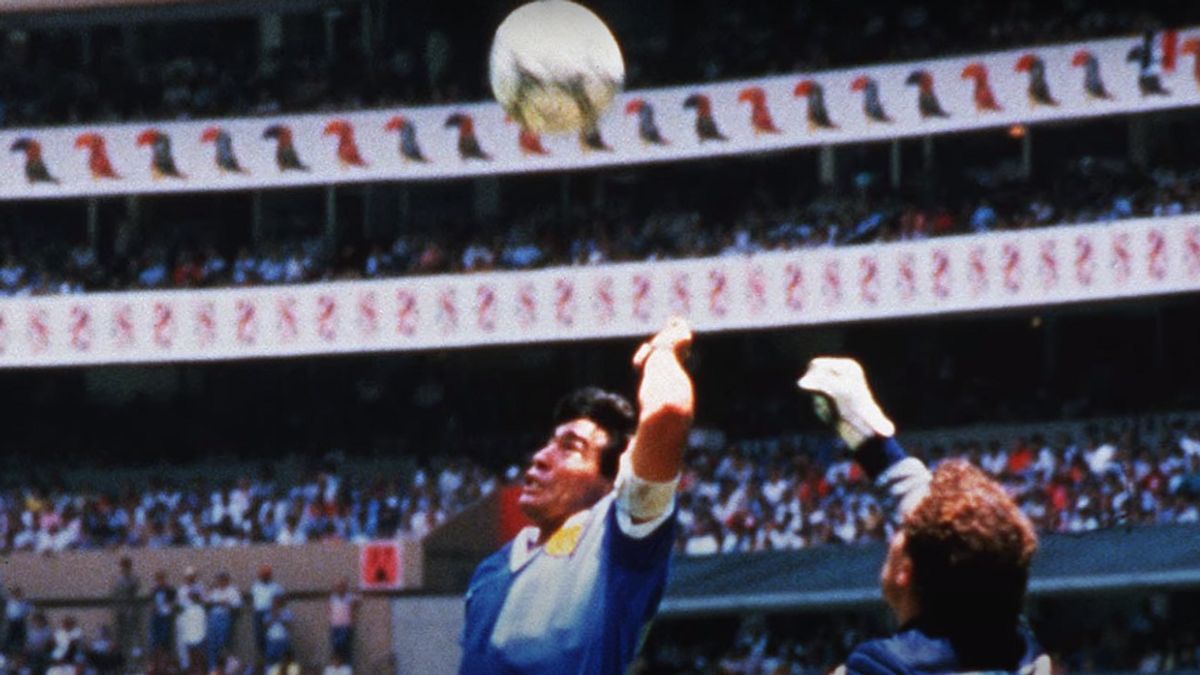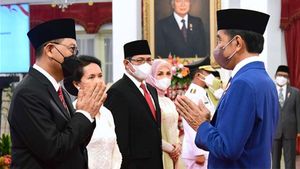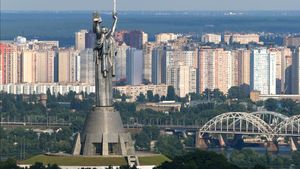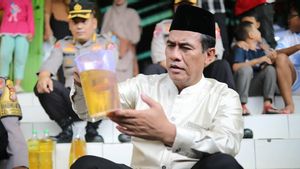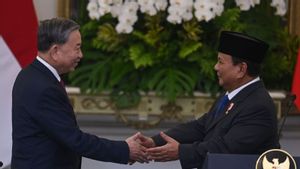JAKARTA - Diego Armando Maradona is a legend. The world knows him as the perfect artist in the green field. Maradona not only builds a beautiful game, but also always becomes an inspiration for the team he strengthens. More than that, Maradona is an ideological warrior. The action of the sensational "hand of God" goal against England in the 1986 World Cup quarter-finals is proof. The goal was not only a number, but also the victory of Maradona's ideology as the main supporter of socialism.
Maradona was born in Lanus, Argentina on October 30, 1960. As a child, Maradona lived under the poverty line. Maradona spent this time in a poor village called Avellanda, which is located in the slum area of Villa Florito, an outer suburb of Buenos Aires.
In the midst of limitations, Maradona's cousin, Beto became the savior. Beto gives a ball to Maradona a birthday present. Since then the ball has been Maradona's most loyal friend in overcoming difficult times.
With the ball given by Beto, Maradona every day hone his talents. Launching the New York Times, Thursday, November 26, Maradona always carries the ball anywhere to practice basic dribbling techniques. If he doesn't bring the ball, Maradona will use other items, be it paper fists, oranges, or whatever as long as he can dribble and kick.

Long story short, Maradona started his football career at the age of eight. His short posture provoked doubts that Maradona could pass the test by a local soccer team, Cebolliotas.
Cebolliotas are Argenitos Juniors' youth team. Cebolliotas coach, Francisco Conejo revealed his first impression of Maradona. Said Conejo: Maradona seemed to come from another planet.
Although doubtful, Maradona can finally break through the door of opportunity to join the Cebolliotas. Maradona paid the opportunity. Conejo was smitten. The coach even called Maradona as the second footballer in the world. According to Conejo, the ball is like a pet who obeys Maradona's feet.
In every appearance on the gridiron, whether in training sessions or matches, Maradona always presents interesting actions. Maradona turns the ball game into a work of art with his dazzling dribbling skills, incredible passes and piercing shots. That complete package is what brings Maradona's life path from a poor Argentinian child to a world football legend.
Loser of British colonialismOne of the most memorable moments in a Maradona career is when he scored the "hand of God" goal in the match against England in the quarter-finals of the 1986 World Cup, Mexico. Emir Kusturica, documentary film director, Maradona (2008) revealed that the goal was a political goal. Maradona, said Kusturica, presented the goal as a form of revenge for Britain's decision to call for an attack on the Malvinas Islands in 1982.
Kusturica even packed the goal scene in a different way. As quoted by Yos Rizal Suriaji and Asmayani Kusrini in their writing in the Tempo Magazine entitled Maradona and Cerita Palem Mas (2008), Kusturica packaged the age of God's hand with a picture of a British warship bombarding Malvinas.
The image was interspersed with speeches by British Prime Minister Margaret Thatcher and President of the United States (US) Ronald Reagan. Kusturica also injected the song God Save The Queen (1977) sung by Johnny Rotten, The Sex Pistols to cover the whole scene: God save the queen / The fascist regime / They made you a moron.
"Maradona is The Sex Pistols on the soccer field," said Kusturica.
[/ read_more]
For Maradona, fighting England is not just a gridiron business, but has become a personal matter. Maradona is known to hate traces of British colonialism in Argentina. Maradona also called God's hand goal as a reward for England's action "stealing" Malvinas. This anti-colonialism attitude has been rooted in Maradona since Britain was entrenched as a colonialist in Argentina during the 19th to 20th centuries.
At that time, like other colonialism, the British came to Argentina to exploit all the resources of the country, from the rail network, banks, docks, convenience stores, to culture. Historian David Downing describes the situation. "Everything is mastered, except the name."
Culturally, Downing exemplifies his penchant for playing polo and drinking tea in the afternoon. This custom has long been recognized as the culture of the British in Argentina. Even football. This sport was introduced by British sailors and railway network workers. Argentina's first football league was initiated by an English school principal in Buenos Aires. However, Maradona rejected that narrative.
“For Maradona, the roots of English football in Argentina have never been real. Football, for the player born in 1960, already belongs to the people of Argentina. He called it 'la nuestra,' which means 'our stuff.' La nuestra is based on the gambeta style, an attractive dribbling attraction between opposing defenders. This style is demonstrated by Maradona when dribbling past seven English players alone, ”said Yos Rizal and Asmayani.
[/ read_more]
Socialism activist
Maradona's off the pitch is also very interesting to follow. Maradona is not only a football mogul but also an activist for socialism. Its roots are Maradona's longstanding anti-colonialism ideology. This ideology has made him appear against all forms of imperialism and fight for equality and justice for society. In all of his movements, Maradona followed in the footsteps of a socialist figure, Ernesto "Che" Guevara, especially in relation to the narrative of equality.
“He has a famous portrait of Ernesto 'Che' Guevara, a compatriot who is revolutionary in the form of a tattoo on one arm. And the face of the Cuban revolutionary, Fidel Castro on one of his feet. His love for Cuba has been exposed over the years. In fact, he often visited the island and spoke with Fidel Castro. As a result, Maradona has become a fierce critic of neo-liberal policies in the continent he loves, ”wrote Telesur English, quoted on Thursday, November 26.

The first time Maradona visited Cuba was in 1987. The visit was made one year after the Argentine team won the 1986 World Cup in Mexico. Since then, Maradona has developed a strong friendship with the commander-in-chief, Fidel Castro. After that, Maradona became a major defender of Cuba and its policies.
Maradona was fascinated by the revolutions in Bolivia and Venezuela. He also visited the two countries many times. Maradona met and made friends with the Bolivian revolutionary Evo Morales and the Venezuelan revolutionary Hugo Chavez. Even Chaves himself surprised Maradona by joining his press conference in 2010.
Chavez joked to reporters that one day Venezuela would beat Argentina and Brazil. Maradona was surprised and smiled. When Chavez died, Maradona visited his friend's grave with Venezuelan President Nicolas Maduro. Since then Maradona has developed a close friendship with Maduro.
“All Hugo left for me is great friendship, extraordinary political wisdom. Hugo Chavez changed Latin American thinking. We bowed to the United States and he showed us that we can walk alone, ”said Maradona after Chavez's death.
Support was also given by Maradona to Maduro, who is currently experiencing a difficult time in government. "Do not give up. In football it doesn't matter if you lose 3-0, never give up. You never give up and you give your all for Venezuela. Long live Maduro! ” he told the President "we are Nicolas' soldiers, I have come here to give him my support."
For his critical attitude, Maradona also received criticism from all lines. However, Maradona paid no heed to it. As he once told his colleague, Fidel Castro: My thoughts are non-negotiable.
[/ read_more]
The English, Chinese, Japanese, Arabic, and French versions are automatically generated by the AI. So there may still be inaccuracies in translating, please always see Indonesian as our main language. (system supported by DigitalSiber.id)
